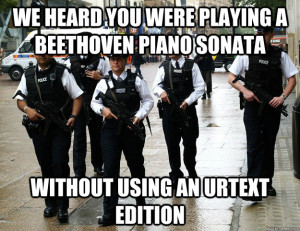The wringing of hands over programming might as well be the wringing of necks because it can literally put a stranglehold on the success of an organization. Warning pop culture reference and cliche dead ahead!
From the Hunger Games (no it doesn’t need my help with a link!) as uttered with such clarity by Haymitch Abernathy (bold my emphasis):
You really wanna know how to stay alive? You get people to like you. Oh! Not what you were expecting. Well, when you’re in the middle of the games, and you’re starving or freezing, some water, a knife or even some matches can mean the difference between life and death. And those things only come from sponsors, and to get sponsors, you have to make people like you. And right now, sweetheart, you’re not off to a real good start.
 ASCAP awards are awarded to those who produce innovative programming especially of American Music as if to say that despite everything, the new music torch is being carried. If barely anyone shows up to those concerts you can still win that award because the number of those who attend is not the point. But the point is that it should be, so I ask the question: What if you program in such a way that you perform half as much new music as anyone else but twice as many people see it because they trust your overall programming? As far as I can tell there’s no award for that although a successful sustainable organization is indeed the greatest reward.
ASCAP awards are awarded to those who produce innovative programming especially of American Music as if to say that despite everything, the new music torch is being carried. If barely anyone shows up to those concerts you can still win that award because the number of those who attend is not the point. But the point is that it should be, so I ask the question: What if you program in such a way that you perform half as much new music as anyone else but twice as many people see it because they trust your overall programming? As far as I can tell there’s no award for that although a successful sustainable organization is indeed the greatest reward.
Before delving further, I want to be clear about one thing and that is, it’s not that programming and the act of programming isn’t important, it’s just that it’s treated as some kind of taboo subject only a chosen few can participate in. The choices are inexplicable and they must be taken for granted as genius, which is often code for self serving. Programming to an organization is like climate change to the world, everybody needs to participate in order to survive and special partisan interests have no place. Programming is a key to the survival of an organization.
I will never forget the greatest compliment I ever received about my programming. I met someone who told me that he and his partner were renewing their subscription. I thanked him profusely and then asked; which programs and artists are you most looking forward to? His answer just floored me. He told me that that the only part of the brochure he looked at was the renewal page, he then wrote a check and sent it in. At first I couldn’t compute and then he explained that they liked every concert the previous season, all the themes resonated, the new and unfamiliar works were set up just right, it never felt too long, it was well rehearsed, and everyone in the orchestra and audience was totally engaged. So for the new season he told me they didn’t want to know the programming because the element of surprise would make it even better! It was at first strange to hear that, I mean with all the time and research that goes into it they didn’t want to know? Then it hit me, they TRUST us, they really LIKE the experience we offer and they LIKE us, so much so that they were willing to renew on faith. I can’t think of a bigger compliment.
I had never previously had the goal of a renewal/donation happening this way but I realized early on that it’s not only about what we program, buy WHY we program what we program and WHO we program for. I also came to believe programming needed to start with a conversation and end in total engagement in the performance with everyone in the know because everyone had been a part of the process in one shape or form. Then, the audience can become perennial rather than annual and when they take your programming for granted, then you’re actually doing something right! I am looking forward into delving deeper into this and to start a conversation about how programming can unlock so much potential for sustainability.
Part 2 – The first time we met….

I took a risk creating a music series built around presenting musicians rather than repertoire. All the players are more than great technical wizards, they are people I want visitors to meet and know because they are amazing human beings. We promote the musician/s and do without programs, using direct conversation from the stage.
Yes — people are learning to trust us. Now Sounds of the South Loop is called “The most intense and imaginative music series in Chicago” – Goldstar Chicago.
Building trust and connecting through people are key.
I await your part 2!!!